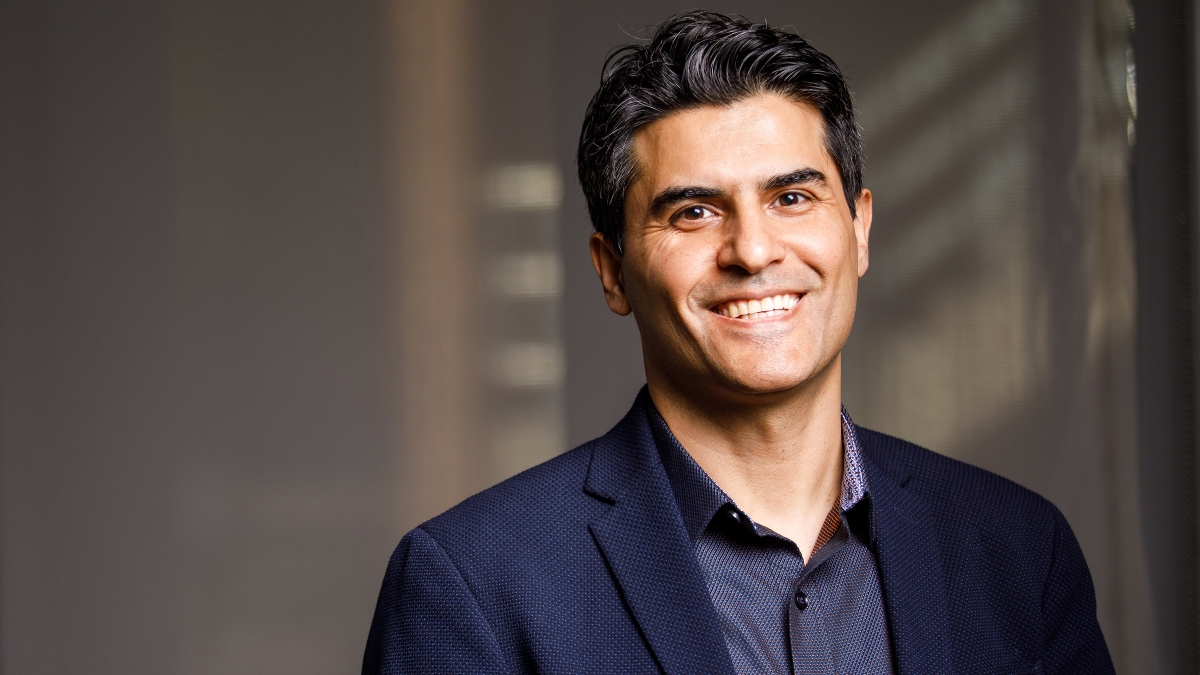ASU researcher's microscale tech is chipping away at cancer, organ failure and neurological disease

Bioengineering Associate Professor Mehdi Nikkhah was inducted as a fellow into the American Institute for Medical and Biomedical Engineering on March 25. Photo by Andy DeLisle/ASU.
Arizona State University’s Mehdi Nikkhah, a biomedical engineer in Arizona State University's School of Biological Health Systems Engineering and a member of the Personalized Diagnostics Faculty at ASU’s Biodesign Institute, is a pioneer in organ-on-a-chip technologies.
For his outstanding contributions to the engineering of biomimetic tissue-on-chip technologies and organoids for disease modeling and regenerative medicine, Nikkhah was inducted as a fellow into the American Institute for Medical and Biomedical Engineering on March 25 during the organization’s 2024 annual event in Arlington, Virginia.
Nikkhah isn't the only impressive faculty from ASU to be awarded with such an honor. Petra Fromme, center director and professor at the ASU Biodesign Center for Applied Structural Discovery, also was inducted as an AIMBE Fellow this year.
AIMBE Fellows represent the top tier of biological engineers and include members from academia, industry, education, clinical practice and government.
“Professor Nikkhah's research and entrepreneurship have propelled tissue-on-a-chip technology from a laboratory setting to a transformative screening tool, revealing insights into cancer and various diseases,” said Heather Clark, director of the School of Biological Health Systems Engineering. “Being named an AIMBE Fellow marks a notable achievement, signifying his inclusion among the top 2% of the biomedical engineering community.”
Organs-on-chips, or OoCs, are microscopic, in vitro platforms designed to mimic the behaviors of cells, organs or complex physiological processes of the body. Tissues and cells, either engineered or patient derived, are grown inside microfluidic chips with tiny channels that enable researchers to manipulate the environments with a high degree of control. The technology also offers a unique perspective to monitor cell behaviors in response to different therapies.
OoC microenvironments include a broad spectrum of specific medical conditions, such as cardiovascular diseases, a range of cancers and neurological diseases, like Alzheimer’s.
Nikkhah's lab has developed several tumor-on-chip technologies, including for rapidly growing brain cancer; metastatic breast cancer, and other disease-on-a-chip models, such as cardiovascular diseases. His team also works in the area of regenerative medicine and combining OoCs with organoids, which are miniaturized, three-dimensional tissue constructs generated from stem cells that mimic organ function.
According to Nikkhah, who was one of 95 inventors named a 2023 senior member of the National Academy of Inventors, OoC “has become a significant field in the past few years, with growing sources of funding and a wide range of research bringing new insights to disease prevention and treatment."
“We are currently working to make our microchip technologies widely accessible to the scientific and pharmaceutical communities for enhanced drug testing and accurate disease modeling,” Nikkhah said. “Hopefully, in near future, with the advent of these technologies, we can bring safer and more efficient therapies to the patients.”
More Science and technology

4 ASU researchers named senior members of the National Academy of Inventors
The National Academy of Inventors recently named four Arizona State University researchers as senior members to the prestigious organization.Professor Qiang Chen and associate professors Matthew…

Transforming Arizona’s highways for a smoother drive
Imagine you’re driving down a smooth stretch of road. Your tires have firm traction. There are no potholes you need to swerve to avoid. Your suspension feels responsive. You’re relaxed and focused on…

The Sun Devil who revolutionized kitty litter
If you have a cat, there’s a good chance you’re benefiting from the work of an Arizona State University alumna. In honor of Women's History Month, we're sharing her story.A pioneering chemist…

